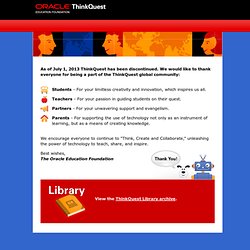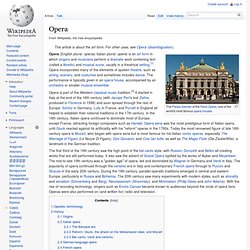

San Diego Opera Spotlight: Handel's Ariodante. Monteverdi, C (1567-1643) - L'incoronazione di Poppea. Monteverdi -〈L'Orfeo〉favola in musica, SV 318 "Vanne Orfeo felice a pieno" (John Eliot Gardiner) Baroque Era - Vocal. As of July 1, 2013 ThinkQuest has been discontinued.

We would like to thank everyone for being a part of the ThinkQuest global community: Students - For your limitless creativity and innovation, which inspires us all. Teachers - For your passion in guiding students on their quest. Partners - For your unwavering support and evangelism. Parents - For supporting the use of technology not only as an instrument of learning, but as a means of creating knowledge. Opera. Opera (English plural: operas; Italian plural: opere) is an art form in which singers and musicians perform a dramatic work combining text (called a libretto) and musical score, usually in a theatrical setting.[1] Opera incorporates many of the elements of spoken theatre, such as acting, scenery, and costumes and sometimes includes dance.

The performance is typically given in an opera house, accompanied by an orchestra or smaller musical ensemble. Opera is part of the Western classical music tradition.[2] It started in Italy at the end of the 16th century (with Jacopo Peri's lost Dafne, produced in Florence in 1598) and soon spread through the rest of Europe: Schütz in Germany, Lully in France, and Purcell in England all helped to establish their national traditions in the 17th century. In the 18th century, Italian opera continued to dominate most of Europe, except France, attracting foreign composers such as Handel. Operatic terminology[edit] History[edit]